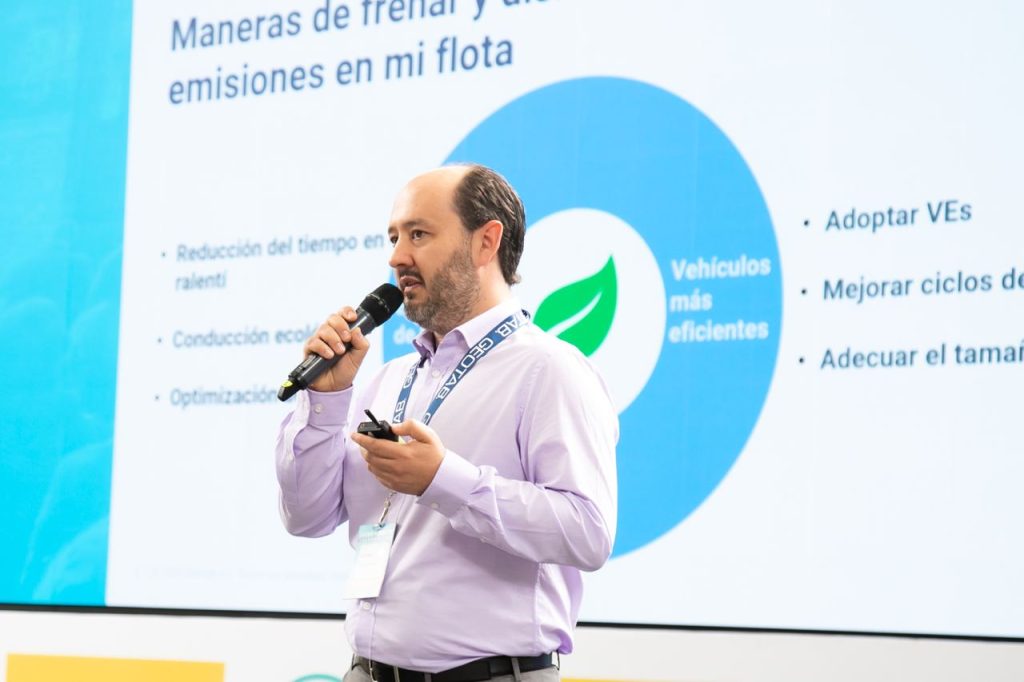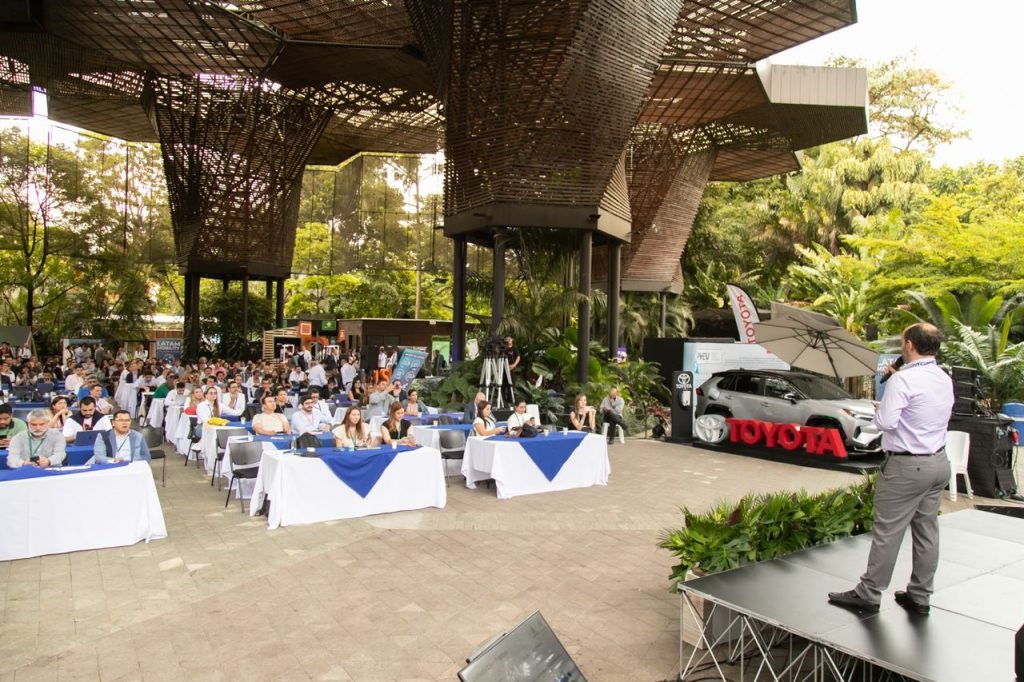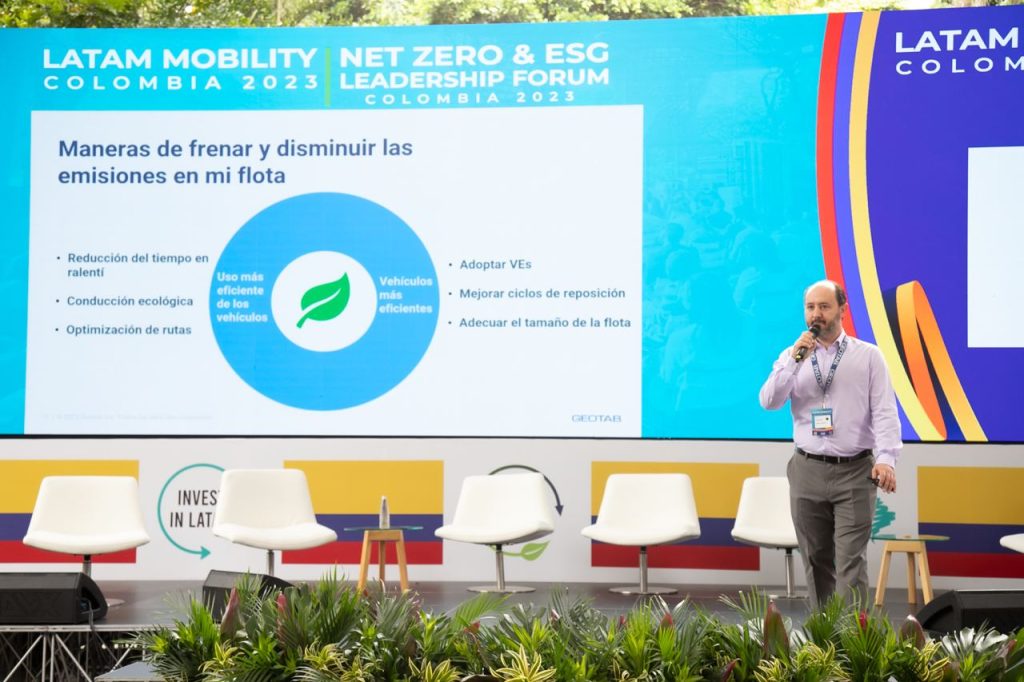Geotab, a leading telematics company with more than 3.2 million connected vehicles, 44,000 customers and 55 billion data processed daily, was present on June 6 at the “Latam Mobility: Colombia 2023“, a meeting organized by the sustainable mobility community in Latin America and attended by more than 700 participants in the city of Medellin.
Pedro Giraldo, Geotab‘s Latin America Business Development Manager, participated in a keynote presentation entitled “Sustainability in Combustion Fleets: A Case Study“, in which he explained how the company is using technology to make fleets more sustainable, improving productivity, performance and directly impacting their emissions.
“At Geotab we are concerned not only with providing technological tools for fleet decarbonization, but also with moving towards our outlined goals of carbon neutrality by 2040, with strategies and actions we have taken to mitigate our footprint as a company. Sustainability is a journey that goes in phases,” Giraldo began.

You may also be interested in: Celsia Launches New 100% Made-in-Colombia Electric Vehicle Charger
Logitrans Case
The Geotab representative gave as an example the work done for Logitrans, a company of Grupo Argos, which has a fleet of 1,400 units of different types and short and long distance routes in Colombia, and whose main challenge is to improve maintenance costs, fuel costs and fleet productivity.
“The company realized that with traditional methods of fuel measurement they could not reach greater efficiencies, so they began to use Geotab‘s telematics, and to consider new variables, such as idling, driving habits, accelerometers, among others. In addition, they found a lot of value in the analysis of the vehicle’s computer codes, which also provide data, but are sometimes difficult to interpret,” said Giraldo.
“Argos began to include variables, and took into account an experience they found in Peru in a similar industry: the load factor in issues of ascents and began to study the altimetries that fleets have in Colombia, and realized that they had different types at the national level depending on the altimetry, that each one needed specific issues, and that the manufacturer’s configuration was not tropicalized,” said the Geotab executive.
Giraldo indicated that the company was sold vehicles for North America, which were not going to achieve the expected performance. “The equipment had 18 gears when in Colombia only 13 are used, and if they needed to reach 105 kilometers per hour to be fuel efficient, the limit in Logitrans was 70. Thanks to a better knowledge of the fleet, they were able to go to the manufacturer to make changes that would help them with configurations to make operations more efficient.

Optimal results
Based on the data analytics that Geotab offers, companies can realize operational disadvantages and failures that allow them to establish continuous improvement, improve processes and be very predictive.
“Logitrans obtained various operational results, such as in emissions, which they managed to reduce by 7% to 10%. In addition, an improvement in fleet availability of more than 95%, i.e., vehicles were not entering the workshop due to unforeseen events, but because of already scheduled routines, since having data intelligence that allows them to see that a vehicle is going to fail, they are ahead of serious damage and operation stoppages,” explained Pedro Giraldo.
“By having change management plans and knowing the data, the company achieved more deliveries per day by being able to move more product. In addition, last-mile routing in cities helped them manage their coverage, i.e., where they could establish a distribution center or plant within a city with an industrial zone. All this thanks to the history of the vehicles and the information provided by telematics,” the executive emphasized.
“Geotab has at its disposal tools for all kinds of vehicles, although it is important to know what is the starting point of each company; how can I compare myself with the market; what are the opportunities and inefficiencies to cover them, and from there, take decarbonization strategies with more efficient vehicles, until reaching the aspirational point: to have a sustainable fleet and become a benchmark in the industry”, ended Giraldo.
The following is the first day of “Latam Mobility: Colombia 2023“:




